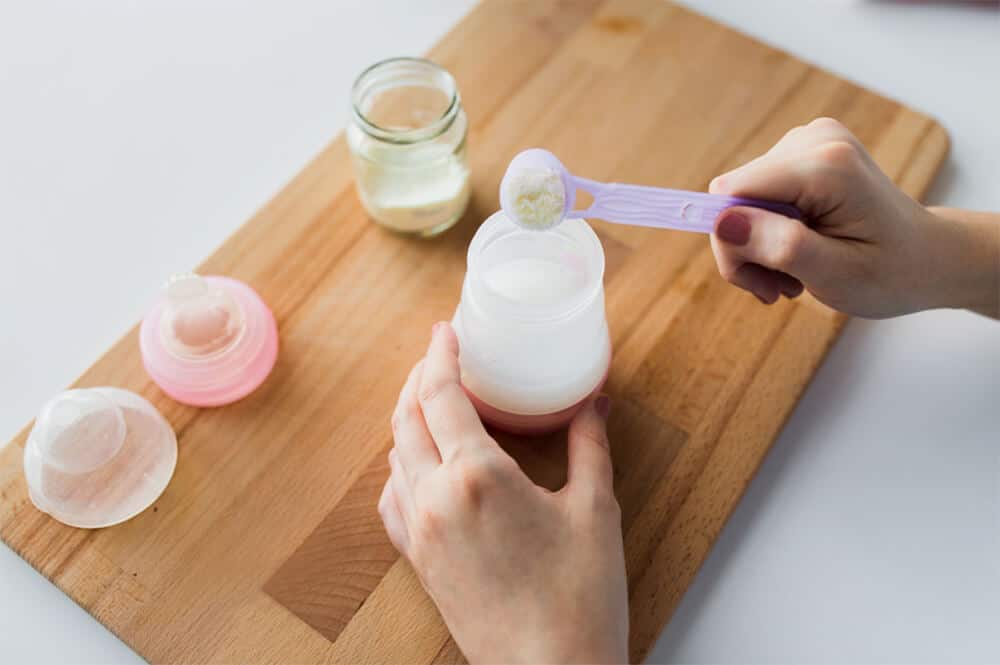
Buying Baby Formula From the UK: How to Do It Safely?
Whether you’re unable to breastfeed or have simply decided that it’s not for you, baby formula is a great way to ensure your little one gets all the right nutrition.
Baby formulas are usually made from cows’ milk and are treated to ensure they contain the required nutrients to support your baby’s growth.
According to the NHS, the cows’ milk first infant formula contains two types of proteins – whey and casein. The first infant formula is based on whey protein, which is easier to digest than other types. The NHS advises that your baby can stay on first formula milk when you introduce solid foods at around six months and drink it throughout their first year.
It adds that there is no evidence switching to a different formula does any good or harm, but if you think a particular formula brand disagrees with your baby, you may want to try another type.
There’s a wide range of brands and types of formula available in pharmacies and shops. The best baby formula from the UK that you choose will depend on your baby’s tolerance, so it’s best always to check labels carefully to make sure you’re buying suitable formula for your baby.
Know The Right Baby Formula

When buying formula, you’ll want to consider what form it comes in. Essentially, there are three types of formula: powdered, liquid concentrate, and ready-to-feed. Each type has pros and cons.
Choosing the best formula for your baby depends on your baby’s needs; however, some things need to be considered. Read below to find out how to pick the best baby formula.
Powder
The powdered formula is the most economical option and the most commonly used.
It must be noted that powdered formulas cannot be sterilized. While it does have a slightly higher risk of contamination in processing, it is unlikely that you will purchase a “bad batch.” Like any prepared food product, the risk is there but not common enough to warrant concern.
In addition to this minor risk, powdered formula is also the most demanding to prepare. It should be prepared with sterile water, meaning tap water must be boiled for at least a minute and then cooled down to room temperature before mixing. You can avoid this time-consuming task by purchasing water that has already undergone this process (“distilled water”), but this will offset some of the economic benefits.
Powdered formula is also less reliable in its nutritional value than liquid formula since the task of measuring leaves room for human error and may end up in a more/less nutritiously concentrated bottle at each feeding. However, this error is usually so minor that it probably won’t make a drastic difference in the baby’s intake.
Liquid/Ready to Feed
The ready-to-feed formula is just as it sounds. It is liquid, sold in a bottle, and ready to feed your baby immediately. Just open the bottle and pour the desired amount. That’s it. It will need to be refrigerated after opening, so if you have a picky eater on your hands, you may need to warm it a bit before the next feeding. (Note: Never warm a bottle in the microwave. It may heat unevenly and result in “hot spots,” burning your baby. You can warm a bottle using a bottle warmer or simply run warm water from the faucet over the outside of the bottle for about a minute.)
Ready-to-feed also comes in single-serve bottles, which are great for traveling. You won’t have to clean any bottles or mix anything, these are ready to go, and you can just recycle them when you’re done. However, I would not recommend these for everyday feeding.
Unlike the powdered variety, liquid formula is sterilized during processing, so the chance of contamination during preparation is less than with powdered formula. Having already been prepared, you can be sure the nutrition content is correct at each feeding.
While the liquid formula is pricier than powder and concentrates, it’s easy to prepare, and you may find it worth the cost. A 32 oz. bottle of liquid formula costs about $8 (depending on the brand) and depending on the baby’s age. You can expect your little one to drink one of these a day!
Verdict? The liquid is the better, safer, and most nutritiously reliable if cost is not an issue. However, if you have a safe and clean water supply, feel confident preparing bottles according to package directions, and don’t mind the task, the powder is much more economical and can be just as safe and nutritious.
How Much Formula Should You Give Your Baby?
In general, newborns swallow one to two ounces per meal. From birth to 6 months, newborns require two to two and a half ounces of formula per pound of body weight every day.
According to that rule, a 10-pound newborn would require 20 to 25 ounces of formula each day. Most doctors advise that babies not consume more than 32 ounces each day.
However, it is critical to follow your baby’s lead and pay attention to their indications for when they are hungry and have had enough to eat. If someone other than you is feeding your infant a bottle, they should be aware of the baby’s indications to see if the baby is full or still hungry.
If you are unsure how much formula your infant needs, consult your pediatrician.
Remember that babies go through phases where they eat a little more or a little less; minor day-to-day differences do not always cause alarm.
However, several warning signals indicate that your baby is either eating too much or not eating enough.
Symptoms of your baby not getting enough formula include:
- Continued sobbing
- Decreased urine production
- Saggy and wrinkled skin
- Gradual weight loss
Signs that your infant is consuming an excessive amount of formula include:
- Irritable bowel syndrome
- Excessive weight increase
- Spitting up or vomiting regularly
- They are pulling their legs up to their chest.
Best Baby Formula Brands UK

We’ve chosen the best powdered infant formula in the UK for you. Our suggestions have received positive responses from parents, including family and friends with small children.
1. Aptamil Baby Formula
Aptamil makes the most popular store-bought, ready-to-drink, and pre-mixed formula milk. It has the same content as its powdered tubs but comes in a convenient plastic bottle that can be ready to go if properly stored. It’s made with cow’s milk.
You will have to pay a premium for these formulas because they have extra packing and are precisely blended. Still, it is occasionally worth it, especially if you are in a hurry. This is appropriate as a sole source of nutrition from birth to 6 months and as part of a weaning diet from 6 months to one year. Here’s a sneak peek at their formula’s ingredients:
Probiotics and prebiotics
Probiotics are beneficial microorganisms found in the digestive tract that aid with digestion. On the other hand, prebiotics are linked sugar chains derived from plants or animals that offer sustenance for these probiotics.
The human body makes these, but not in sufficient quantities; thus, they must be supplemented, especially in newborns. Aptamil adds them as a component in their baby product to offer your kid advantage for digestion.
Their innovative blend of galactooligosaccharides (GOS) and fructooligosaccharides (FOS) derived from various plants ensures that probiotics are nourished and thrive to promote proper digestion for your newborn.
Vitamins and Minerals
These inorganic elements are necessary for a healthy diet. The minerals are broadly classified as major and minor, with major being required in copious amounts and minor being required in trace or minute amounts. Sodium, Phosphorus, Magnesium, Potassium, Chloride, and Calcium are the major minerals, while Zinc, Manganese, and Copper are minor.
Iron is essential for blood production, calcium and Vitamin D for strong bones and growth, zinc, iron, vitamins A, C, and D for immune system support, and DHA for better eye development. However, unlike in breast milk, the makeup of these
minerals in cow’s milk differs somewhat, affecting their bioavailability for absorption and digestion.
Aptamil supplements them with inorganic salts such as Sodium Citrate and Calcium Carbonate, among others.
Lactose babies generate lactase enzymes, which convert lactose to glucose and galactose. Lactose is absorbed in these basic forms.
Aptamil understands this and acquires whole milk with just the necessary amounts of lactose for the composition of its baby formulae based on the expertise and experience gained over the years. It includes skimmed milk with emulsifiers and stabilizers to help the formula combine readily with the water and oils.
Whey Protein
Aptamil combines a variety of proteins, including demineralized whey milk, to ensure that your baby’s body cells grow effectively while still allowing for the creation of enzymes and hormones. The science underlying whey protein has two distinct advantages. Just like breast milk, which has a high whey protein to lactose ratio, whey has an almost identical ratio, making it nearly identical to breast milk.
Second, it aids digestion in lactose-intolerant newborns and makes more necessary amino acids available. Finally, it improves the formula’s stability.
Vegetable Oils
Several vegetable oils are combined to match the complex fatty acids contained in breast milk. Sunflower oil, rapeseed oil, coconut oil, high oleic sunflower oil, and palm oil are among the oils used in Aptamil. Aside from duplicating breast milk fatty acids, they are a vital fat supply that creates fat layers that shield the newborn against heat loss and are used as energy for the growing child.
Dairy-Based Blend
Aptamil employs a Dairy-Based Blend, of which 29% is fermented to reduce reliance on artificial sweeteners and chemicals. Artificial sweeteners and additives should be avoided since they predispose infants to obesity and other heart-related problems.
Infants benefit from a Dairy-Based Blend, as in Aptamil, and partially fermented in this case, including a lower risk of metabolic disorders and a boost to the immune system’s resistant capabilities.
Pros:
- Gluten-free
- Easy to digest
- Some varieties are non-GMO
- Helps with colic relief.
- Sachets are less expensive and more convenient.
Cons:
- It contains palm oil.
- It contains fish oil, which may cause allergic reactions and is unsuitable for vegans.
- When compared to other infant formulae, it is more expensive.
Kendamil
Kendamil’s crystal-clear, unshakeable, and laser-sharp vision has propelled it to be one of the greatest, most natural, nutritious, and healthy formulas, with recipes that comprise the following ingredients:
100% Organic
Simply speaking, organic farming is raising livestock and cultivating crops without synthetic fertilizers, pesticides, herbicides, or genetically modified organisms.
Kendamil organic formula, on the other hand, goes a step further. They contract whole milk producers from the broad plains of Yorkshire, Kent, and Somerset for closer monitoring. These cows are treated humanely, as they are free to roam and graze on the field’s natural nourishing grasses and pastures.
During the summer, the cows’ feed is supplemented with hay and silage stored over the winter. They are then led to roofed, draught-free, well-lit houses, where the cows can live stress-free.
As a result, your newborn will receive milk that is high in Omega 3 fats (ARA) and CLA fatty acids, ensuring healthy eye and brain development.
Only Natural and Healthy Fats
Formula-producing businesses add vegetable oils and skimmed milk to match the composition of breast milk and guidelines issued by regulatory authorities such as the EU, FDA, and WHO, among others. Except for palm oil, these plant and animal-based additives have little to no effect on infants, and the plant-based ones jeopardize initiatives to increase forest cover and reverse climate change.
In contrast, palm oil drastically lowers calcium and fat absorption in newborns, causing pain and constipation. Kendamil, on the other hand, uses natural full cream cow milk fat to decrease the need for more vegetable oil.
Milk with high oligo-glyceride content (medium and high) and high palmitic acid content reduces constipation, boosts fat and calcium absorption, and improves baby digestion.
Non-Allergenic and Vegetarian
Infants require a good dose of DHA and ARA to grow optimally and to be able to withstand a variety of infections. If not from breast milk, the primary source is fish oil. However, Kendamil recognizes that some newborns may be allergic to fish or the hexane solvents used in oil extraction. For this reason, Kendamil sources algae in the same way as fish.
Kendamil goes straight to the source and decants the oil from DHA-rich algae, ensuring that the oil is devoid of residual solvents if hexane is used. The ultimate result is a DHA/ARA-rich formula that is nutritionally better and suitable for vegetarians and allergic infants.
Additionally, if your baby is intolerant to cow’s milk, you can try the Kendamil goat formula. It is just as healthy yet easier on your little one’s digestion.
Pros:
- Gluten and soy-free.
- It is suitable for vegetarians.
- It’s natural.
- It has a lengthy shelf-life.
- There is a recyclable metallic tin.
- Has a good baby acceptance rate.
- It is natural and healthful because it does not contain palm oil.
- It contains prebiotics, which aid digestion.
Cons:
- There are no probiotics.
- Some infants may be allergic to milk products.
Baby Formula Shipment Outside of the U.K.
How to Buy Baby Formula in the UK
When purchasing baby formula in the UK, buying in bulk is a terrific method to save money. While some regulatory constraints limit supermarkets and other retailers in the UK from offering enormous discounts on formula, there are methods to save significantly when purchasing in much more significant amounts.
If you want to buy infant formula in bulk in the UK, you should go to a bulk specialist or Amazon. Many of the best newborn formulas in the UK mentioned here are available in bulk containers and offer significant discounts. Once you’ve secured your bulk order, we can assist you with shipping in the most suitable way for you.
My UK Mailbox gives you a few options after placing a significant order for infant formula. We provide customized large item delivery, where we can work with you to create a completely customized shipping package, or we can combine and repack your items.
We suggest using our customized large-item service if you are placing several bulk orders over a period of time. If you’re placing many small items from different stores, we recommend using our combine & repack option. You may save money by holding your things for free for 30 days and combining each order that arrives in our warehouse into one larger shipment.
Simple & Straightforward UK to US Baby Milk Forwarding
So, how does it work? Simply register for My UK Mailbox, and we’ll provide you with a genuine UK shipping address to use when purchasing your baby milk.
We will supply you with your own UK postal address so that you can accept deliveries from UK retailers who do not ship overseas or charge exorbitant international shipping charges. We partner with DHL, TNT, and the Post Office to deliver your packages.
This means you may have all of your purchases delivered here and consider it as you would your house for delivery purposes.
Once the purchase is complete and we have received it, we may either transmit it to you at affordable international rates or hold it and consolidate it with any other purchases from the UK that you may be making to help save money.
We’ll combine all of your UK orders into a single tracking number and shipment so that you get everything simultaneously and don’t have to spend as much for postage.
Take Advantage of Our Free Storage
Don’t be concerned about needing to make multiple purchases from the UK at the same time.
We’ll gladly bundle them all together and keep them for you completely free of charge, so you can rest assured that you won’t rack up a large charge while you wait for all of your various purchases to come.
Whether it’s several supplies of baby milk or items from other retailers like Amazon and eBay, simply enter your UK delivery address when placing your orders, and we’ll handle the rest.
We provide 20 days of free storage time for Starter users, 30 days for Standard members, and 60 days for Premium members. This is a lot of time to get all of your shopping done without worrying about storage expenses.
Shop in the United Kingdom With My UK Mailbox and International Shipping
The superb quality of UK baby formula is well renowned around the world. It satisfies the requirements of the United Kingdom, the European Union, and the World Health Organization. As a result, it is frequently in high demand. A package forwarding service, such as My UK Mailbox, lets you order to an address in the United Kingdom and then have your package sent to you.
Sign up for your free account today, and you’ll have access to a completely free forwarding address. This allows you to buy baby formula from the UK as though you reside there. Get the best milk formula brands in the UK delivered to your door, no matter where you live. Learn how package forwarding works, and then place your order with confidence, knowing that My UK Mailbox will get your baby milk formula to you.
It is important to note that there may be complications when transporting infant milk from the United Kingdom to other nations. Although milk may currently be shipped freely to European countries from the UK, we have had customers in other countries suffer problems due to customs limitations. If you have any questions about customs limitations in your country, please contact us before placing your order. We will be able to provide information about our experience shipping to various countries throughout the world and whether we have experienced any problems with baby milk products.



